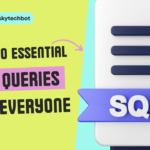Are you excited about building innovative software solutions and shaping the digital future? Starting as a software engineer might seem daunting, but with the right guidance, it can be an incredible journey. In this blog, we’ll break down what software engineering is, the skills you need, and how you can get started. Let’s dive in!
1. What is Software Engineering?
Software engineering is the process of designing, developing, and maintaining software applications. It combines creativity with logical problem-solving to create tools, websites, apps, and more. From mobile apps to enterprise systems, software engineers are behind the tech we use daily.
// Example of a simple program in Python
print("Welcome to Software Engineering!")
Software engineers use code to solve real-world problems. For example, developers create food delivery apps to make ordering meals easy and efficient.
2. Skills Required for Software Engineering
To become a software engineer, you need both technical and soft skills. Here’s a list to get you started:
- Programming: Learn languages like Python, JavaScript, or Java.
- Problem-solving: Break down complex tasks into manageable steps.
- Version Control: Use tools like Git and GitHub for collaboration.
- Communication: Share ideas and collaborate effectively with teams.
3. How to Start Your Journey
Getting started as a software engineer involves clear steps:
- Step 1: Learn Programming Basics
Begin with beginner-friendly platforms like Sky Tech Bot, freeCodeCamp or Codecademy. Understand key concepts like variables, loops, and functions. - Step 2: Pick a Specialization
Explore web development, mobile app development, data science, or game development. - Step 3: Practice with Projects
Start small—build a to-do list app, personal portfolio website, or calculator program.
4. Building a Portfolio
A portfolio showcases your work and skills. Include projects that highlight your ability to solve problems and create functional applications.
5. Networking and Community
Join communities like GitHub, LinkedIn, and Stack Overflow to connect with fellow engineers and learn from their experiences. Networking can help you find mentorship and job opportunities.
6. Overcoming Challenges
Starting a career in software engineering can feel overwhelming. Here are tips to tackle common challenges:
- Feeling Stuck: Break problems into smaller steps and research solutions online.
- Debugging Issues: Debugging is part of the process. Use tools and forums to resolve errors.
- Lack of Confidence: Practice regularly and celebrate small achievements.
Why Software Engineering is Worth It
Software engineering is more than a career—it’s an opportunity to innovate and create. Whether you’re developing apps, analyzing data, or designing systems, your work can impact millions of lives.
Conclusion
Starting your journey as a software engineer may feel challenging, but every expert was once a beginner. Focus on learning, practicing, and building connections, and you’ll be well on your way to a successful career in software engineering.
Ready to begin? Pick a language, start coding, and create your first project today!


